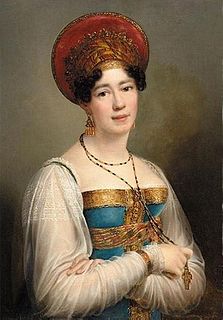Top 132 Quotes & Sayings by Sophie Swetchine
Explore popular quotes and sayings by a Russian author Sophie Swetchine.
Last updated on April 16, 2025.
Love enters the heart unawares: takes precedence of all the emotions--or, at least, will be second to none--and even reflection becomes its accomplice. While it lives, it renders blind; and when it has struck its roots deep only itself can shake them. It reminds one of hospitality as practiced among the ancients. The stranger was received upon the threshold of the half-open door, and introduced into the sanctuary reserved for the Penates. Not until every attention had been lavished upon him did the host ask his name; and the question was sometimes deferred till the very moment of departure.
There are minds constructed like the eyes of certain insects, which discern, with admirable distinctness, the most delicate lineaments and finest veins of the leaf which bears them, but are totally unable to take in the ensemble of the plant or shrub. When error has effected an entrance into such minds, it remains there impregnable, because no general view assists them in throwing off the chance impression of the moment.



















